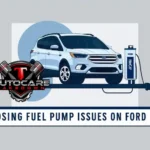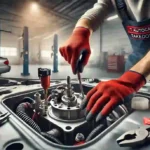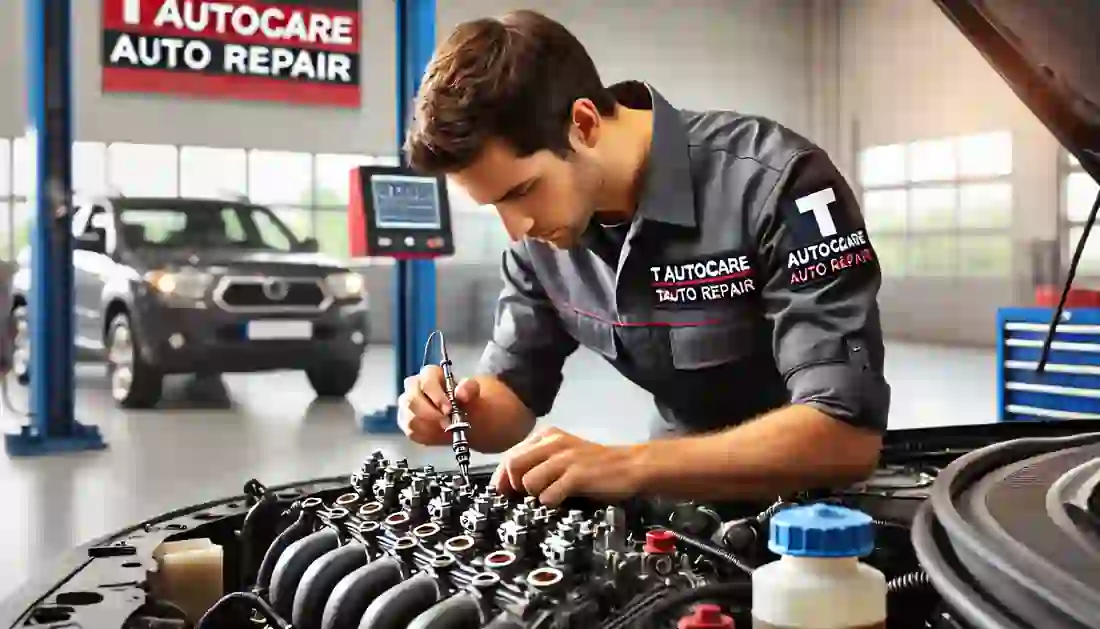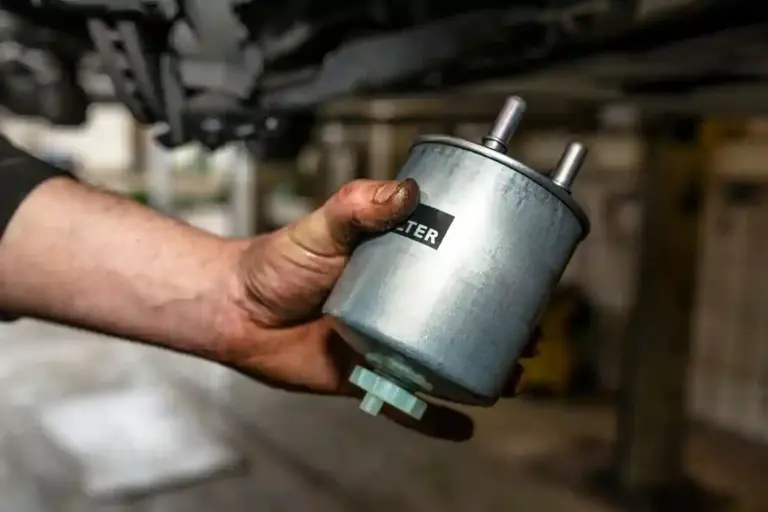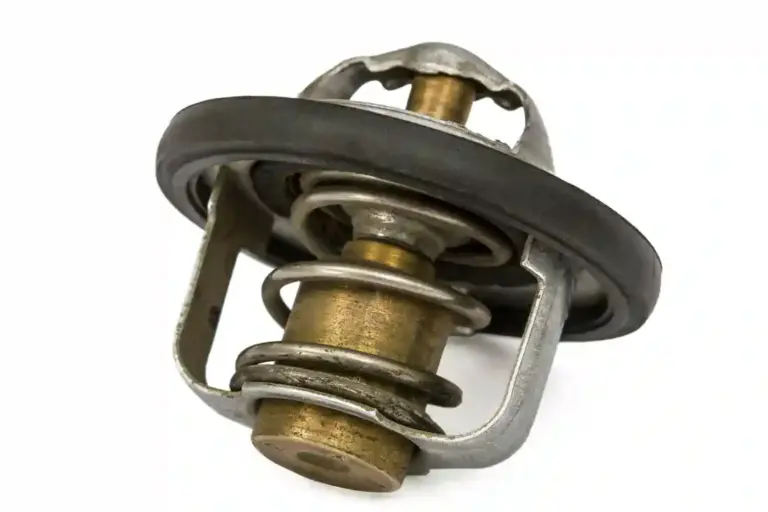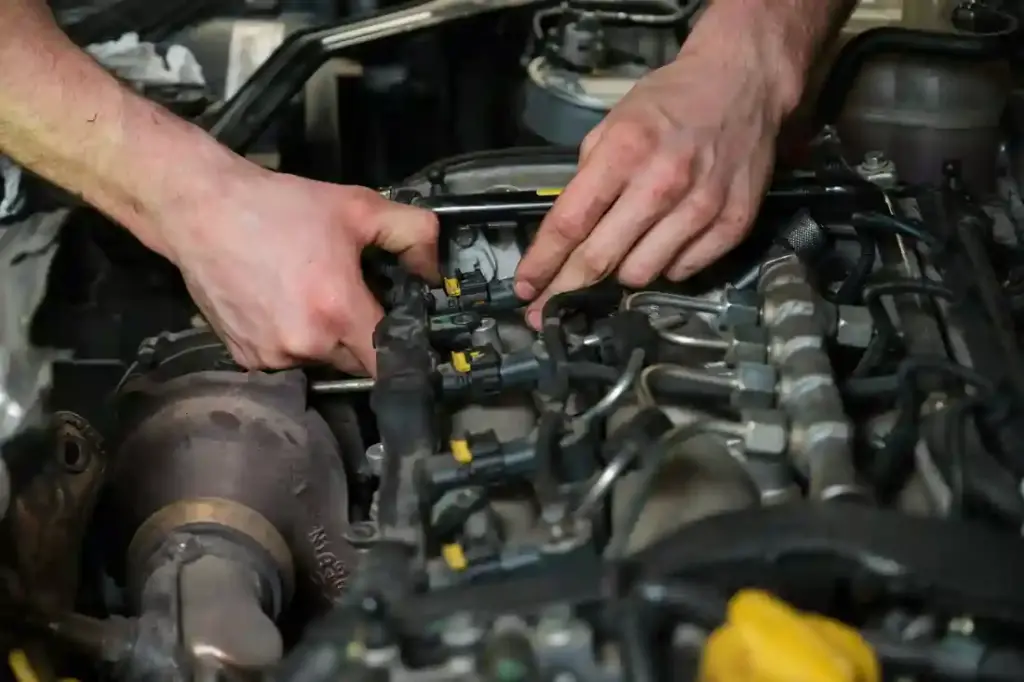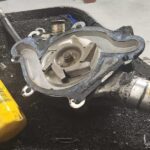Your car’s fuel pump is a critical component that efficiently delivers fuel from the gas tank to the engine. When it begins to fail, you may notice bad fuel pump symptoms, such as engine sputtering or trouble starting. Ignoring these symptoms can lead to serious performance issues and even leave you stranded.
At T Autocare Takedown, we understand the importance of identifying and addressing fuel pump issues early. Here’s a comprehensive guide to recognizing the signs that your fuel pump needs replacing
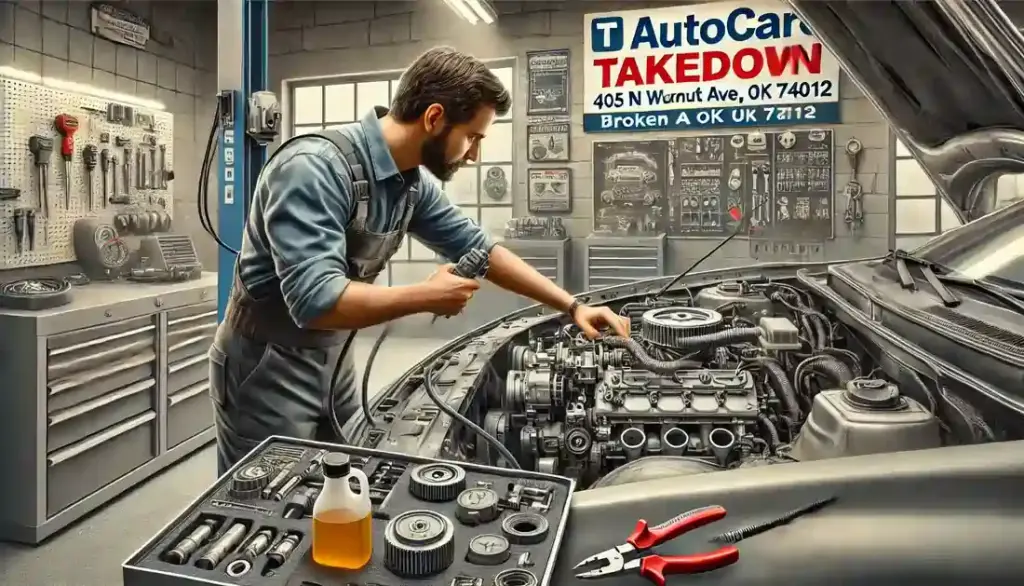
What Does a Fuel Pump Do?
A fuel pump is essential for keeping your vehicle running smoothly by moving fuel from the gas tank to the engine. This part makes sure fuel reaches the engine at the right pressure, allowing it to perform efficiently. Without a reliable fuel pump, your engine might experience problems like rough idling, sputtering, or, in severe cases, complete failure.
If you’re experiencing any of these issues, it could be time to check your Fuel System Services or consider Fuel Pump Replacement. Addressing these early can help prevent bigger problems down the road.
Why Most Cars Use Electric Fuel Pumps
Most modern cars use an electric fuel pump, specifically designed to provide a steady flow of fuel with the right pressure. This balance is crucial since it helps the engine perform well in all conditions—whether you’re cruising down the highway, idling in traffic, or starting up on a cold morning.
When the fuel pump starts to wear out, it may struggle to keep up with these demands. As a result, you might notice certain symptoms, including Check Engine Light warnings or unusual noises. If this is the case, a Fuel System Inspection can help you pinpoint the issue.
In essence, the fuel pump acts as the “fuel lifeline” for your engine. Recognizing the signs of a worn-out fuel pump early can help prevent breakdowns and keep your car running reliably for the long haul.
For DIY Enthusiasts or Curious Learners
If you’re someone who likes to understand your vehicle or tackle small repairs yourself, there’s a great video by Scotty Kilmer that goes deeper into how fuel pumps work and common symptoms of failure. Scotty Kilmer is known for his practical, straightforward advice on car maintenance, and in this video, he walks through fuel pump basics and troubleshooting tips. Watching this can give you a better understanding of what’s happening under the hood if you’re experiencing fuel pump issues.
Signs of a Failing Fuel Pump
Engine Stuttering and Sputtering: What It Means
Symptoms of Engine Stuttering
When driving at a steady speed, have you felt your engine jolt, stutter, or hesitate unexpectedly? This sensation can feel like your car is “hiccuping” as it tries to maintain speed. These sudden jolts are often one of the earliest signs that your fuel pump may not be working properly.
For more insight into engine issues, check out our guide on Common Engine Problems and How to Prevent Them.
Why Does Engine Sputtering Happen?
The fuel pump’s main job is to supply a steady flow of fuel to the engine. When the pump begins to fail, it can struggle to maintain the fuel pressure your engine requires, leading to an uneven fuel supply. This lack of consistency causes the engine to sputter or hesitate, especially when maintaining higher speeds.
Engine stuttering is a common issue we see in vehicles coming into our shop, as it often points to a weak or worn-out fuel pump. To confirm whether a faulty fuel pump is the culprit, consider scheduling a Fuel System Inspection with us.
Unexpected Engine Surges: What to Watch For
Symptoms of Unexpected Surges
If you notice your car suddenly gaining speed or experiencing bursts of power without any input, this could indicate that your fuel pump is sometimes pushing too much fuel to the engine. These unexpected surges can make driving feel unpredictable, which can be unsafe.
Why Do Engine Surges Happen?
A failing fuel pump can sometimes send too much fuel to the engine, resulting in these sudden power bursts. This irregular fuel flow can lead to abrupt changes in your car’s behavior on the road. Regular maintenance checks can help spot fuel pump problems early, ensuring your vehicle stays safe and reliable.
Preventing Fuel System Issues
Routine maintenance can prevent engine surges by catching fuel system issues early. Other components, such as Fuel Injectors, also contribute to fuel delivery and should be inspected regularly to maintain smooth engine performance.
Reduced Fuel Efficiency
Symptoms: If you find that you’re visiting the gas station more often than usual, even though you haven’t changed your driving habits, your car might be getting fewer miles per gallon. This drop in fuel efficiency can be a sign that something is wrong with the fuel pump.
For additional ways to improve fuel usage, check out our Tips for Improving Fuel Efficiency.
Why It Happens: When a fuel pump becomes inefficient, it can force the engine to use more fuel than it actually needs. This extra fuel use lowers your car’s fuel economy, meaning you’re spending more on gas. Mechanics often catch this problem during Routine Maintenance Checks, as reduced fuel efficiency is a common symptom of a failing fuel pump. Addressing these issues early not only saves on fuel costs but also helps prevent further wear on your engine.
High-Pitched Noises
Symptoms: If you hear a whining or screeching noise coming from the area near your fuel tank while your car is running, it could be a warning sign. These sounds are unusual and can often mean something is wrong with the fuel pump.
Why It Happens: Over time, parts inside the fuel pump can wear out, leading to these odd noises. When the pump is close to failing, it can make whining or screeching sounds, indicating it’s struggling to work properly. If you notice these noises, it’s a good idea to get your car checked at an auto repair shop to avoid a sudden breakdown.
Difficulty Starting the Engine
Symptoms: If your engine takes longer than usual to start, needs a few tries to get going, or won’t start at all, this could mean there’s an issue with your fuel pump.
Why It Happens: For the engine to start smoothly, it needs a steady supply of fuel. A weak or failing fuel pump might not be delivering enough fuel to get the engine running properly. This is a common problem that repair shops often see, especially as fuel pumps wear out over time. If you’re experiencing this, it may be time to get the fuel pump checked to avoid further trouble starting your car.
Engine Stalling
Symptoms: If your engine suddenly stalls, especially when you’re accelerating quickly or even just sitting still, it might be due to a fuel pump problem. These unexpected stalls can be frustrating and even dangerous.
Why It Happens: When the fuel pump is failing, it can’t always provide enough fuel to keep the engine running, especially during high demands like heavy acceleration or idling. Without a steady fuel supply, the engine can shut off suddenly. Regular car service can help spot fuel pump issues early, reducing the risk of unexpected stalls.
Loss of Power Under Load
Symptoms: If your car loses power when going uphill or while carrying a heavy load, this can be a sign of a fuel pump problem. You might notice the engine struggles to keep up, making it harder to drive smoothly in these situations.
Why It Happens: When driving in demanding conditions, like climbing hills or hauling extra weight, the engine needs more fuel to keep running strongly. A failing fuel pump may not be able to provide that extra fuel, leading to a noticeable drop in power. This is a common issue that mechanics often find during thorough maintenance checks in our garage.
Additional Tips for Diagnosing Fuel Pump Issues
Check Fuel Pressure: One way to see if your fuel pump is working properly is by checking the fuel pressure. You can use a tool called a fuel pressure gauge to measure this. The fuel pump should keep a steady, correct pressure for the engine to run smoothly. If the pressure is too low, it could mean the pump isn’t doing its job.
Inspect the Fuel Filter: Sometimes, a clogged fuel filter can cause the same symptoms as a failing fuel pump. If the fuel filter is blocked, it can restrict the fuel flow, making it seem like there’s an issue with the pump. Checking the fuel filter to make sure it’s clean and clear can help rule out this problem.
Preventative Measures for Fuel Pump Health
Taking care of your fuel pump can help avoid costly repairs and keep your vehicle running smoothly. Here are some tips to help extend the life of your fuel pump:
1. Keep a Consistent Fuel Level: Try to avoid driving with a near-empty gas tank. When fuel levels are too low, the pump can overheat since it relies on the surrounding fuel to stay cool. Additionally, running low on fuel can pull sediment from the bottom of the tank into the fuel system, which can cause wear on the pump and clog it over time.
2. Use Quality Fuel: Poor-quality fuel may contain contaminants that can damage the fuel pump and other engine parts. Using high-quality gasoline can help prevent these contaminants from building up in the fuel system and keep the pump functioning well.
3. Change the Fuel Filter Regularly: A clean fuel filter allows fuel to flow smoothly to the engine. When the filter becomes clogged, it makes the pump work harder, which can cause it to wear out faster. Replacing the fuel filter as recommended in your vehicle’s maintenance schedule can reduce this strain on the pump.
4. Schedule Regular Maintenance Checks: Mechanics can check your fuel system during routine inspections to catch any early signs of fuel pump problems. Regular check-ups make it easier to prevent issues before they become serious, saving you time and money in the long run.
By following these simple steps, you can help extend the life of your fuel pump and keep your vehicle running smoothly.
Planning for Fuel Pump Maintenance
Maintaining your car’s fuel pump is essential for long-term vehicle health and can help prevent unexpected expenses. By keeping an eye on your fuel system and addressing issues early, you can avoid costly repairs down the line. For tips on budgeting for repairs and maintenance, check out our guide on Car Maintenance Budget: Saving Money. Planning ahead ensures you’re prepared for maintenance costs, helping you keep your car in top shape without breaking the bank.
Conclusion: When to Seek Professional Help
Certain signs of a failing fuel pump require expert attention. Here’s why it’s best to consult an auto repair shop:
Accurate Diagnosis: Fuel pump symptoms can be tricky because they often mimic other issues, such as a clogged filter or ignition problem. A professional mechanic has the tools and expertise to correctly diagnose the issue, saving you time and money on unnecessary repairs.
Safety Assurance: Fuel pump problems can lead to unpredictable stalling or power loss, which can be dangerous on the road. An auto repair shop can ensure your vehicle is safe to drive by thoroughly inspecting the fuel system and fixing any problems before they escalate.
Prevent Further Damage: A failing fuel pump can strain other parts of the fuel system, such as the injectors or fuel lines. By catching and addressing the problem early, a repair shop can prevent additional wear on these components, potentially saving you from higher repair costs down the line.
Professional-Grade Repairs: Fuel pump replacements and fuel system repairs require special tools and skills. A trained mechanic can ensure repairs are done right the first time, using quality parts and following best practices, so you can trust your vehicle’s performance.
At T Autocare Takedown, we offer a wide range of automotive services. Our expert mechanics are equipped to diagnose and replace faulty fuel pumps, ensuring your vehicle remains in top condition.
Contact Us:
- Address: 1501 W Detroit St, Broken Arrow, OK 74012
- Phone: (539) 367-3738
- Website: T Autocare Takedown
If you notice any of these symptoms, don’t hesitate to bring your vehicle to our Broken Arrow auto repair shop. Our experienced team is ready to provide the professional auto care and service you need to keep your car running smoothly. Regular compression testing is a proactive step in car maintenance that ensures your engine’s longevity and performance. Trust our expert mechanics for all your vehicle repair needs.
Useful Links on Car Fuel Pumps:
- White’s Automotive Center – Understanding signs associated with a failing fuel pump
- YourMotorGuide – How to Know If My Fuel Pump is Bad ?
- Carfax – Bad Fuel Pump Symptoms

